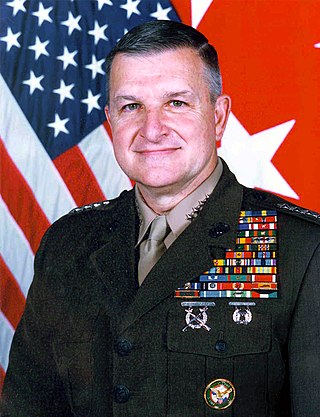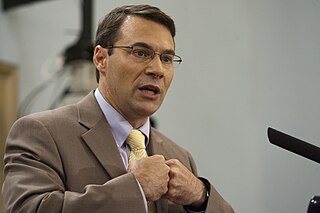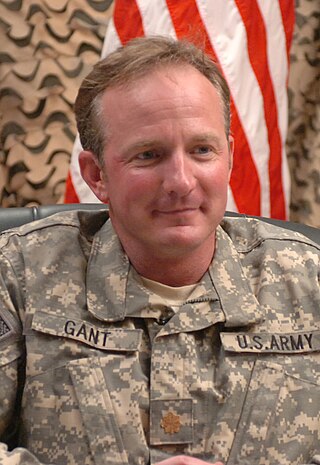
Anthony Charles Zinni is a retired United States Marine Corps general and a former Commander in Chief of the United States Central Command (CENTCOM). From 2001 to 2003, he served as a special envoy for the United States to Israel and the Palestinian Authority. From 2017 to 2019, he served as a special envoy to help resolve the Qatar diplomatic crisis.

The Special Activities Center (SAC) is a division of the United States Central Intelligence Agency responsible for covert and paramilitary operations. The unit was named Special Activities Division (SAD) prior to 2015. Within SAC there are two separate groups: SAC/SOG for tactical paramilitary operations and SAC/PAG for covert political action.
Walid Phares is a Lebanese-American politician, scholar, and conservative pundit.

Ian Fishback was a United States Army officer, who became known after he sent a letter to Senator John McCain of Arizona on September 16, 2005, in which Fishback stated his concerns about the continued abuse of prisoners held under the auspices of the Global War on Terror.
Opposition to the War in Afghanistan (2001–2021) stems from numerous factors, including the view that the United States invasion of Afghanistan was illegal under international law and constituted an unjustified aggression, the view that the continued military presence constitutes a foreign military occupation, the view that the war does little to prevent terrorism but increases its likelihood, and views on the involvement of geo-political and corporate interests. Also giving rise to opposition to the war are civilian casualties, the cost to taxpayers, and the length of the war to date.

The Quds Force is one of five branches of Iran's Islamic Revolutionary Guard Corps (IRGC) specializing in unconventional warfare and military intelligence operations. U.S. Army's Iraq War General Stanley McChrystal describes the Quds Force as an organization analogous to a combination of the CIA and the Joint Special Operations Command (JSOC) in the United States. Responsible for extraterritorial operations, the Quds Force supports non-state actors in many countries, including Hezbollah, Hamas, Palestinian Islamic Jihad, the Houthi movement, and Shia militias in Iraq, Syria, and Afghanistan. According to Michael Wigginton et al., the Al-Quds Force is "a classic example of state-sponsored terrorism."

David John Kilcullen FRGS is an Australian author, strategist, and counterinsurgency expert who is currently the non-executive chairman of Caerus Associates, a strategy and design consulting firm that he founded. He is a professor at Arizona State University and at University of New South Wales, Canberra.
Daveed Gartenstein-Ross is an author and the founder and chief executive officer of Valens Global. In addition to his role at Valens Global, Dr. Gartenstein-Ross is a Senior Advisor on Asymmetric Warfare at the Foundation for Defense of Democracies. An internationally-recognized expert on political violence, his work primarily focuses on the development of strategic plans, execution of analytic projects, and instruction at the professional and academic levels. In 2011, Gartenstein-Ross wrote Bin Laden's Legacy: Why We're Still Losing the War on Terror.

John Albert Nagl is a retired Lieutenant Colonel in the United States Army. He is a former president of the Center for a New American Security and former headmaster of The Haverford School. Nagl is an expert in counterinsurgency and has published two books on military strategy.

The war on terror, officially the Global War on Terrorism (GWOT), is a global counterterrorist military campaign initiated by the United States following the September 11 attacks of 2001, and is the most recent global conflict spanning multiple wars. Some researchers and political scientists have argued that it replaced the Cold War.

The Center for a New American Security (CNAS) is a think tank in Washington, D.C. specializing in United States national security issues, including terrorism, irregular warfare, the future of the U.S. military, the emergence of Asia as a global power center, war games pitting the U.S. against the People's Republic of China, and the national security implications of natural resource consumption, among others.

Bruce O. Riedel is an American expert on U.S. security, the Middle East, South Asia, and counter-terrorism. He is currently a nonresident senior fellow in the Center for Middle East Policy at the Brookings Institution and an instructor at Washington College in Chestertown, Maryland.

Kaboom: A Soldier's War Journal was a popular military blog from November 2007 to June 2008, before it was shut down by the writer's military chain of command. The author of the online journal, who went by the pseudonym of LT G, wrote about the front-line experiences in the Iraq War as a United States Army soldier. A scout platoon leader, LT G often incorporated the trials and tribulations of his platoon in his writings, offering a brash and brutally honest perspective of modern warfare. Kaboom was shut down, and subsequently deleted, after LT G made a post detailing his turning down of a promotion in an effort to stay with his soldiers.

Phillip Eugene Carter is an American lawyer, writer, and former officer in the United States Army. Carter was a founding member of Iraq and Afghanistan Veterans of America, and he also served as a principal of the Truman National Security Project. He was senior fellow and counsel at the Center for a New American Security, and director of the CNAS research program on the Military, Veterans & Society. Beginning September 2018, he served as the Director of the Personnel & Resources Program at the Homeland Security Operational Analysis Center in Washington, D.C. Carter now works as corporate counsel for Google, supporting the company's public sector business, and teaches as an adjunct professor of law at Georgetown University Law Center.

Stanley Allen McChrystal is a retired United States Army general best known for his command of Joint Special Operations Command (JSOC) from 2003 to 2008 during which his organization was credited with the death of Abu Musab al-Zarqawi, leader of Al-Qaeda in Iraq. His final assignment was as Commander, International Security Assistance Force (ISAF) and Commander, United States Forces – Afghanistan (USFOR-A). He previously served as Director, Joint Staff from August 2008 to June 2009. McChrystal received criticism for his alleged role in the cover-up of the Pat Tillman friendly fire incident. McChrystal was reportedly known for saying what other military leaders were thinking but were afraid to say; this was one of the reasons cited for his appointment to lead all forces in Afghanistan. He held the post from June 15, 2009, to June 23, 2010.

Bruce R. Hoffman is an American political analyst. He specializes in the study of terrorism, counter-terrorism, insurgency, and counter-insurgency. Hoffman serves as the Shelby Cullom and Kathryn W. Davis Senior Fellow for Counterterrorism and Homeland Security on the Council on Foreign Relations, and is a professor at the School of Foreign Service of Georgetown University. In addition, he is the Professor Emeritus and Honorary Professor of Terrorism Studies at the University of St Andrews, and is the George H. Gilmore Senior Fellow at the U.S. Military Academy's Combating Terrorism Center.

David William Barno is a retired lieutenant general of the United States Army. He was commander of Combined Forces Command-Afghanistan from 2003 to 2005.
John Noonan is an American conservative national security commentator and analyst. He was the national security policy advisor to Jeb Bush during his presidential campaign, and foreign policy advisor and speechwriter for Mitt Romney in 2012. He was a principal defense writer for The Weekly Standard and a policy director of the Foreign Policy Initiative.

The Maywand District murders were the thrill killings of at least three Afghan civilians perpetrated by a group of U.S. Army soldiers from January to May 2010, during the War in Afghanistan. The soldiers, who referred to themselves as the "Kill Team", were members of the 3rd Platoon, Bravo Company, 2nd Battalion, 1st Infantry Regiment, and 5th Brigade, 2nd Infantry Division. They were based at FOB Ramrod in Maiwand, in Kandahar Province of Afghanistan.

Jim Gant is a former United States Army Special Forces officer. He served for over 50 months in combat in Iraq and Afghanistan and was wounded seven times. He was awarded a Silver Star for his actions in the Iraq War in 2007, and wrote an influential monograph on Afghanistan titled One Tribe at a Time: A Strategy for Success in Afghanistan. Following his last deployment in 2010–12, he was relieved of command and forced to retire after violating military regulations and conducting an extramarital affair with reporter Ann Scott Tyson at his combat outpost in Kunar Province, Afghanistan. Gant has been credited with inspiring the creation of the Afghan Local Police and the strategy of Village Stability Operations in Afghanistan.
















